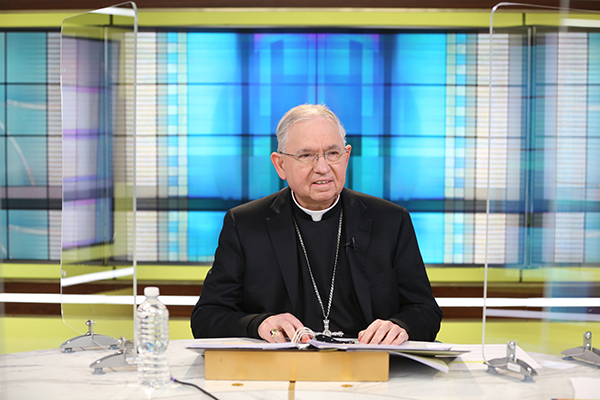
NEW YORK — A new virtual format left little room for dialogue at day one of the U.S. Bishops annual fall meeting, but for one 45-minute stretch more than a dozen bishops gave their takes on laicized ex-cardinal Theodore McCarrick.
The Vatican last week released its long-awaited report into McCarrick’s rise through the American episcopacy despite decades old allegations of sexual abuse and misconduct against him. Pope Francis removed McCarrick from the priesthood in 2019 after new-found allegations were found credible.
Bishops that spoke took their comments in different directions, but many acknowledged they agreed with others that spoke before them. Among the comments was a call for more information about McCarrick’s finances, a suggestion that all bishops learn the personality traits of predators and for bishops to keep a frequent and open line of communication with their priests.
Archbishop José Gomez of Los Angeles offered prayers and encouragement for the victims in his first opening address as United States Conference of Catholic Bishops president. He also called on his fellow bishops to “renew our commitment today to protecting children and vulnerable adults and to eliminating this scourge of abuse from the church.”
“The lay people understand there will be these kinds of problems in the future. What they are needing right now is confidence that there will be a process in place that when an accusation comes forward it will be treated with the seriousness it deserves,” Bishop Shawn McKnight said.
Bishop Mark Brennan of Wheeling-Charleston suggested changes to the vetting process for candidates of the episcopacy. Brennan said once a priest is chosen to become a bishop his name should be published and given a 30 to 60-day timeframe for people to comment.
“You might well surface things at that time that would affirm the appointment, or deter it,” Bishop Brennan said. “Serious accusations could be investigated. We might avoid promoting someone to the episcopacy who really does not deserve it.”
Bishop William Wack of Pensacola-Tallahassee and Cardinal Blase Cupich of Chicago echoed comments they made to The Tablet last week about the McCarrick report.
After each bishop spoke, Archbishop Gomez thanked them for their comments. However, there was no action taken or any further dialogue on anything said.
Bishop McKnight of Jefferson City suggested lay people be more involved in addressing situations like McCarrick in the future. It’s important, he said, for transparency and it will give people confidence in the way the situation is handled.
Bishop Wack talked about the autonomy all bishops have and told the other clerics that it’s important to “correct a brother when we see him doing something that could be wrong.”
Cardinal Cupich focused on the victims. He reminded everyone that the report couldn’t have happened without their courage to come forward. It’s important to keep listening to them, he added.
“The more that we listen to victims and make it public that we’re meeting with victims the word will get out there that we are on the side of the victims,” Cardinal Cupich said. “We will learn to have our hearts moved the more we listen to victims and I think it’s important for us to do that.”
The McCarrick report was the only agenda item that had a real discussion
In his pre-recorded address from before the McCarrick report, Apostolic Nuncio Archbishop Christophe Pierre talked about “dark clouds” that exist like a “throwaway culture” that lends itself to abortion and euthanasia, the polarization of society, the growth of secularization in which “people live as if God didn’t exist,” and the pandemic. He called on bishops to come together and lead by example.
“In a world of suffering, we are called to become neighbors to others. As bishops, we have a special responsibility to lead by example, demonstrating what it means to be a neighbor,” Archbishop Pierre said.
In one of the few comments not related to McCarrick, Bishop John Stowe of Lexington expressed concerns about the USCCB’s ad hoc committee against racism’s outside funding, warning it could force the committee to take direction from its funders.
He urged the USCCB to directly fund the project.
The Nov. 17 portion of the meeting is shorter from 1:00-2:45 p.m. Eastern Time. Notable agenda items include: Reflections on the pandemic and a conversation regarding racism.
So far, the 2020 elections haven’t been on the agenda.
